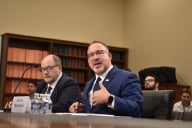You have /5 articles left.
Sign up for a free account or log in.
A former New York City schools chancellor plans to use technology -- and the Jack Kent Cooke Foundation’s $700 million endowment -- to connect more low-income students with prestigious colleges and universities.
The foundation, which during its first 15 years has mainly awarded grants and scholarships, is now working with technology companies such as IBM to produce virtual college search and advising tools, among other technology-mediated initiatives. Those free tools will serve students who lack those services, said newly appointed executive director Harold O. Levy -- and as a marketing strategy for the foundation.
“The Jack Kent Cooke Foundation for years has lived under the radar screen,” Levy said. “That’s about to change. We’re the largest scholarship foundation in America, and we need to get our name out.”
Levy became the foundation’s third executive director in September, the latest move in a career that has included stints with Citigroup and Kaplan Inc. as well as a seat on the Education Department’s Committee on Measures of Student Success. From 2000 to 2002, Levy served as chancellor of the New York City Schools, which with about 1.1 million students is the largest school district in the U.S.
Harold O. Levy on "This Week"
The new executive director of the Jack Kent Cooke Foundation will discuss his plans to use technology to help high-achieving, low-income students Friday on "This Week," Inside Higher Ed's free weekly news podcast. Sign up here for notification of new podcasts.
Since its founding in 2000, the foundation has worked to address undermatching -- the fact that talented low-income students are less likely to enroll at institutions whose rigor matches their academic abilities -- well before the term became hot in education policy circles.
The foundation’s programming stretches from high school through graduate school, but it is perhaps best known for its “last-dollar” scholarships. Eligible students can receive up to $40,000 a year for three years, wiping out the need for personal contributions or student loan debt. The foundation also awards fellowships to researchers working to help those students and six-figure grants for organizations working to increase access to higher education.
Last year, investments in those programs totaled $26.5 million, scattered across projects such as helping students transfer from community colleges to selective four-year institutions. Over the last 15 years, the foundation has doled out more than $125 million in scholarships to about 1,800 students, as well as an additional $79 million in grants.
Levy said the foundation’s new projects are “going in a bunch of directions,” but he did offer some specifics.
The foundation, with help from partnering technology companies, will build a college search engine and a virtual advising tool aimed at low-income and first-generation college students, though usable by anyone. To serve as many students at once, Levy said, the tools will to some extent be automated.
“In a perfect world, it might look like [Apple’s virtual assistant,] Siri,” Levy said. “It asks questions, it in effect consults the database and gives you preliminary levels of information, points you to databases that could be helpful and asks you further questions to clarify your thinking.”
That kind of technology exists “all over the place,” for example in the virtual assistants that pop up when someone has issues with signing in to an online bank account, Levy said. But while he said the technology has only now become sophisticated enough for use in higher education, Levy conceded that an automated service still can’t beat an actual human being -- nor is that the foundation’s goal.
“It’s not equivalent of the $40,000 Park Avenue counselor services you can buy, and I’m not pretending it’s the equivalent of a college counselor of a suburban high school who doesn’t have an overwhelming workload,” Levy said. “It’s a first level of support for the kid who’s struggling. That’s exactly in the sweet spot of what this foundation can do.”
The foundation will also host online contests for students to win scholarships. To market those efforts, Levy said the foundation will tap into his experience from Kaplan, where he served as executive vice president and helped found the School of Education.
“There are half a dozen ways we will get the word out,” Levy said “We will market this using every one of the honed tactics of the for-profit colleges.”
Levy described the projects as works in progress and did not offer a specific timeline for the rollout.
As part of its marketing efforts, Levy said, the foundation plans to bring selective high schools together to raise awareness about undermatching.
“I’m not for a minute suggesting [that] with our endowment we can fix the problem,” Levy said. “We can save... call it 250 kids, but the direction we’re headed in is to raise the flag for these very high-performing children who are not being considered and who are not being supported.”








